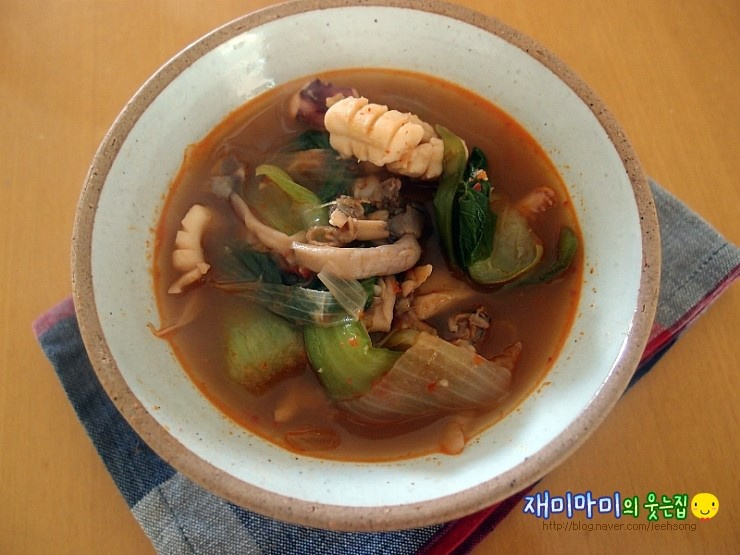Refreshing Seafood Jjamppong
Seafood Jjamppong (with Rice): Say Goodbye to Greasy Jjamppong!

This is a jjamppong recipe that captures the authentic Chinese restaurant flavor while being refreshingly clean and light, without the usual greasiness. Enjoy a hearty meal with rice!
Main Ingredients- 1 squid
- 200g clams
- 3-4 stalks of bok choy
- 100g oyster mushrooms
- 1/2 bell pepper
- 1/2 onion
- 1/2 green onion
Seasoning Paste- 1 Tbsp chili powder (gochugaru)
- 1 Tbsp soy sauce (for soup)
- 1 Tbsp fish sauce (anchovy or sand lance)
- 1 Tbsp minced garlic
- Pinch of black pepper
- 1 Tbsp cooking wine (mirin)
- 4-5 cups stock (anchovy, kelp, or rice water)
- Salt to taste
Chili Oil- 2 Tbsp cooking oil
- 1 tsp chili powder (gochugaru)
- 1 Tbsp chili powder (gochugaru)
- 1 Tbsp soy sauce (for soup)
- 1 Tbsp fish sauce (anchovy or sand lance)
- 1 Tbsp minced garlic
- Pinch of black pepper
- 1 Tbsp cooking wine (mirin)
- 4-5 cups stock (anchovy, kelp, or rice water)
- Salt to taste
Chili Oil- 2 Tbsp cooking oil
- 1 tsp chili powder (gochugaru)
Cooking Instructions
Step 1
First, prepare the seafood and vegetables. Clean the squid, remove the ink sac, and cut it into bite-sized pieces. Soak the clams in salted water to purge any sand, then rinse them under running water. Trim the base of the bok choy. Remove the tough ends from the oyster mushrooms and separate them into strands. Slice the bell pepper and onion into strips. Slice the green onion diagonally. Starting with fresh, well-prepped ingredients is key to delicious jjamppong!

Step 2
Heat 2 tablespoons of cooking oil in a pot over medium-low heat. Add the sliced onion and green onion and sauté until fragrant. This step draws out the natural sweetness from the vegetables, deepening the broth’s flavor.

Step 3
Once the onion and green onion begin to turn translucent, add the oyster mushrooms and stir-fry them together. The mushrooms will add another layer of savory flavor to the dish.

Step 4
Add the prepared squid to the pot and stir-fry quickly. Avoid overcooking the squid, as it can become tough. Just cook it until it changes color.

Step 5
Now it’s time to add the flavor base! In a small bowl, combine 1 tablespoon of chili powder, 1 tablespoon of soup soy sauce, 1 tablespoon of fish sauce, 1 tablespoon of minced garlic, a pinch of black pepper, and 1 tablespoon of cooking wine. Mix these ingredients well to create the seasoning paste. Add this paste to the pot and stir-fry with the other ingredients until everything is well coated. This will infuse the dish with a spicy and savory aroma.

Step 6
Pour in 4-5 cups of stock (or rice water) and bring it to a rolling boil over high heat. Once boiling, reduce the heat to medium and let it simmer to allow the flavors to meld beautifully. Using rice water can add a subtle creaminess and depth to the broth.

Step 7
When the broth has developed a good flavor, add the bok choy and the purged clams. Cook for another few minutes until the clams open. Once the clams open, they are cooked, so don’t overcook them.

Step 8
Taste the broth and adjust the seasoning with salt if needed. (Tip: Traditionally, Chinese jjamppong often includes oyster sauce or doubanjiang. However, if you don’t have them or prefer not to use them, this recipe uses fish sauce, soup soy sauce, and salt for a delicious result. This specific seasoning is adjusted to my taste, so feel free to modify it according to your preference.)

Step 9
For an extra kick of flavor and an appealing look, let’s make some chili oil. In a small bowl, mix 2 tablespoons of cooking oil with 1 teaspoon of chili powder. Microwave this mixture for about 2-3 minutes (adjust time based on your microwave’s power). Drizzle this homemade chili oil over the jjamppong just before serving to enhance its aroma and taste. If you prefer a thicker consistency, you can add a slurry made from 1 tablespoon of starch mixed with 2 tablespoons of water.



